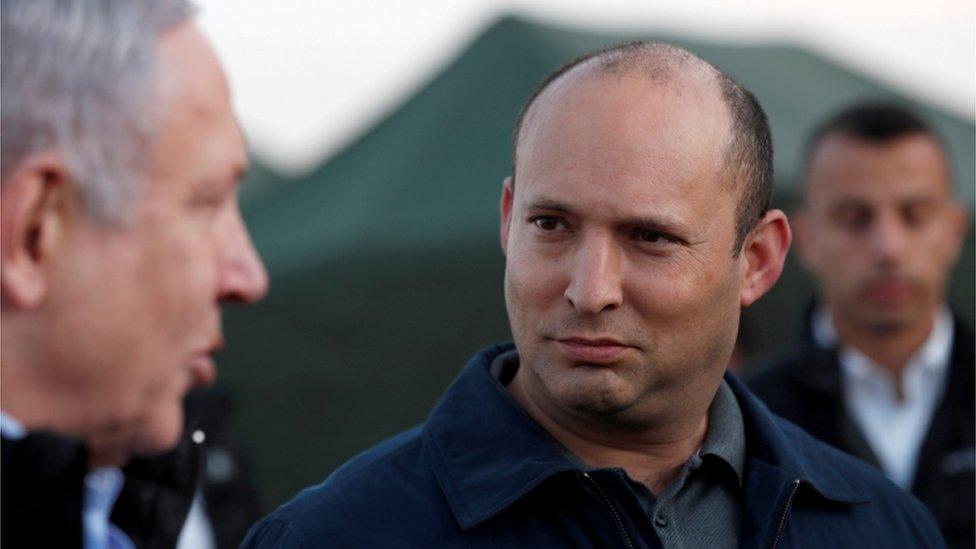Naftali Bennett: The rise of Israel's new PM
- Published

Naftali Bennett's support became crucial for the formation of a coalition government after the last election
Naftali Bennett, Israel's new prime minister, is a former commando and self-made tech millionaire who bills himself as further to the right than the man he replaces - Benjamin Netanyahu.
Mr Bennett has long held ambitions to be prime minister, but his new role is remarkable given his right-wing nationalist party, Yamina, won only a handful of seats in the last general election.
Despite his faction coming joint fifth, with seven MPs, Mr Bennett was propelled into the position of kingmaker, with his support vital if either of the two rival blocs competing for power were to be able to form a viable governing coalition.
He was offered the premiership as a shared role by both Mr Netanyahu, who has been in power since 2009, and the centrist opposition leader Yair Lapid. In the end, Mr Bennett sided with Mr Lapid, despite their wide ideological differences.

Mr Bennett was a top aide to Benjamin Netanyahu before the two fell out
Naftali Bennett, 49, was once considered a protégé of Mr Netanyahu, whose chief of staff he was from 2006 to 2008, until the pair fell out. He left Mr Netanyahu's Likud party and joined the right-wing national religious Jewish Home party, entering parliament after leading it to success in the 2013 election.
He went on to serve as a minister in every coalition government until 2019, when his newly formed New Right alliance failed to win any seats in that year's election. Just 11 months later, Mr Bennett reversed the loss, returning to parliament as head of Yamina (Hebrew for "rightwards").
Often labelled an ultra-nationalist (he has described himself as "more right-wing" than Mr Netanyahu), Naftali Bennett is outspoken in his advocacy of Israel as the Jewish nation state and Jewish historical and religious claims to the West Bank, East Jerusalem and the Syrian Golan Heights - territory occupied by Israel since the 1967 Middle East war.
He has long championed the right of Jewish settlement in the West Bank (he was once the head of the Yesha Council, the political representative group for Jewish settlers), although he has said Israel has no claims on Gaza (from which Israel withdrew troops and settlers in 2005). More than 600,000 Jews live in about 140 settlements in the West Bank and East Jerusalem, considered illegal by almost the entire international community, though Israel disputes this.
The fate of the settlements is one of the most contentious issues between Israel and the Palestinians, who seek their removal and the establishment of an independent state in the West Bank and Gaza, with East Jerusalem as its capital. Interfering in, let alone halting, settlement activity is anathema to Mr Bennett, who considered the pro-settlement Mr Netanyahu as untrustworthy on the issue.

An ultra-nationalist, Mr Bennett says Israel should extend sovereignty over most of the West Bank
Fluent in English and media-savvy, Mr Bennett frequently appears on foreign TV networks, defending Israel's actions. Blunt talking and combative, in a domestic television debate he once admonished an Israeli Arab member of parliament for saying Jews had no right to settle in the West Bank, telling him: "When you were still swinging from trees, we had a Jewish state here."
Mr Bennett rejects the notion of the creation of a Palestinian state alongside Israel - the so-called two-state solution to the Israeli-Palestinian conflict (an issue he has likened to "shrapnel in the buttocks") advocated by much of the international community, including US President Joe Biden.
"As long as I have any power and control, I won't hand over one centimetre of land of the Land of Israel. Period," he said in an interview in February 2021. Rather, Mr Bennett advocates strengthening Israel's hold on the West Bank - territory he refers to by its Biblical Hebrew name of Judea and Samaria - by annexing most of it.
Mr Bennett has also taken a hard line towards dealing with the threat from Palestinian militants, for whom he has said he supports the death penalty. This has never been applied in Israel apart from in the case of Adolf Eichmann, a Nazi architect of the Holocaust who was convicted in Jerusalem in 1961 and hanged the following year.
He objected to a truce with Gaza's Hamas rulers which ended a flare-up of fighting in 2018, and accused the group of effectively murdering dozens of its own civilians killed in Israeli air strikes carried out in response to rocket fire from Gaza in renewed hostilities in May 2021.

Mr Bennett appeared in disguise in a 2014 video mocking what he said were apologist Israelis
The theme of Jewish pride and national self-confidence is one which Mr Bennett, who wears the kippah head-covering of religious Jews, has made his signature. In a 2014 party campaign, he parodied the New York Times and Israel's left-wing Haaretz newspaper for criticising Israeli actions, appearing in a social media video disguised as a hipster Israeli, external repeatedly saying "sorry", before revealing himself and declaring: "Starting today, we stop apologising."
Mr Bennett's political ascent follows earlier distinctions in the military and in business. He served in two branches of the Israeli special forces during his army service, before setting up and selling hi-tech companies, becoming a multi-millionaire in the process.
Speaking about his wealth in an interview in 2014, he said: "I don't eat 17 steaks and I don't have a private plane or yacht. It simply bought me freedom to do what I want."
Mr Bennett was officially named the new prime minister on 13 June, prompting celebrations in Tel Aviv among some who sought to see Mr Netanyahu's ouster.
His government will be unlike any which has preceded it in Israel's 73-year history - made up of an unprecedented coalition of parties, it was approved with a razor-thin majority of 60-59.
Mr Bennett will be prime minister until September 2023 as part of a power-sharing deal with Yair Lapid, leader of the centrist Yesh Atid, who will then replace him.